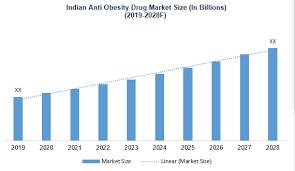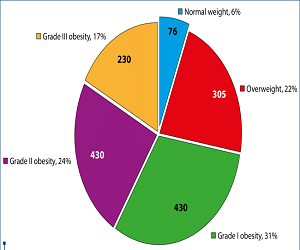Theme: Investigating the Foster Innovations for Obesity and Weight Loss
Obesity Meeting 2023
25th Global Obesity Meeting welcomes you to attend which is going to be held in April 17-18, 2023 at Rome, Italy. We invite you to join us at the Obesity Meeting 2023, where you will be sure to have knowledge with scholars from around the world for a good health. World-renowned speakers, the most recent methods, progresses, and the newest updates in Obesity Meeting 2023 are hallmarks of this conference.
Obesity is associated with huge number of risks to the human population and ultimately leading to health risks and bariatric surgery. Obesity Meeting 2023 Conference is being hosted to emphasize on the anticipation for enhanced and secure life. Childhood Obesity leads to health threats like Oncological disorders of the thyroid, asthma, esophagus, colon, and other parts of the body, Diabetes, gallbladder disease and gallstones, osteoarthritis, gout, and high blood pressure. This conference concentrates on mitigating the problems related to highlighting on the preventive measures and the recent advancements that meet fitness.
We are sure that the International Conference on Obesity (Obesity Meeting 2023) will be a unique opportunity for high quality scientific program with session lectures, symposia, workshops, poster presentations and different programs for participants from throughout the world.
Conference series LLC LTD organizes 1000+ Global events every year across USA, Europe, & Asia-pacific regions with support from more than 1000 more scientific societies and publishes 700+ Open access journals which contains over 50000 eminent personalities, reputed scientists as editorial board members and reviewers.
Targeted Audience:
- Obesity & Endocrinology Associations and Societies
- BMI Training Institutes
- Health Promoters
- Public Health Professionals
- Pharmacists
- Drugs & R & D Medical Devices Manufacturing Companies
- Weight loss specialists
- Clinical Research Scientists & Students
- Metabolic & Bariatric Surgeons
- Physicians
- Integrated Health Professionals
- Registered Dieticians & Nutritionists
- Diabetes Educators
- Physical Therapists
- Industry Professionals
- Yoga & Fitness Professionals
- Medical Colleges
- Business Entrepreneurs
Why to Attend?
Nutrition Professionals, Directors, CEO’s, Presidents, Vice-presidents, CMIO’s, CNIOs, Professors, Associate Professors, Assistant Professors, Clinicians, Business Delegates to improve the general health status of the population. The proportions of people suffering from the various diseases are expected to increase in future according to a recent statistical survey. According to recent statistics, fusion of medical with nutrition is helping a lot in decreasing the rate of bad health in coming years in short period of time. Realizing this imperative, Conference series is set to organize International Conference on Obesity Meeting 2023 this year with a view to enhance research and promote awareness aiming in developing solutions for the challenges encountered. Obesity Meeting 2023 will comprise of many leading keynote speakers and session speakers who will be delivering their speech on the current research topics of Advancements in the field of medical informatics. The young researchers and the student participants will gain the opportunity to grab the Best Poster Award by presenting their work as a poster presentation and Young Researcher Forum.
Track 1:Obesity
The abnormal buildup of body fat, which typically surpasses 20% or more of a person's optimal body weight, is known as obesity.Obesity raises the risk of getting sick, becoming disabled, and dying. Obesity treatment is indeed the designation of a scientific subfield that deals with obese care and research. Since obesity has expanded to be a significant health issue in the United States, treating obesity is now a separate field of medicine and surgery.
Track 2 : Childhood Obesity
Childhood obesity may be a major risk factor for serious upcoming and future health issues. An epidemic of metabolic disorders, such as heart disease and polygenic disorders, may develop in the future if a child has a high BMI. Most teenage children's organs are among the early physical impacts of obesity, along with gallstones, hepatitis, sleep apnea, and elevated intracranial pressure. Additionally, overweight toddlers are more likely to become overweight adults as they age. Children can be kept from becoming obese by adopting healthier eating habits with the aid of their parents. It is possible to encourage children to adopt healthy lifestyles by refraining from offering them foods high in calories. They shouldn't become an addiction for young people. Through frequent games and other activities, they should encourage young people to exercise.
Track 3: Childhood Obesity Prevention
Obesity prevention is crucial. Once produced, fat cells stay in your body permanently. Fat cells can be reduced in size but cannot be eliminated. The key to preventing weight gain, according to specialists on obesity, is to check fat intake rather than calories. Therefore, just 30% of calories should be from fat, according to the National Cholesterol Education Program. Because most people eat more than they recognize, maintaining a thorough food journal is a helpful method for assessing eating patterns.
Track 4 : Nutrition
Food substances are ingested and processed by an animal or plant through a process called nutrition. Along with vitamins, minerals, and electrolytes, essential nutrients also include protein, carbohydrates, and fat. Typically, 15% of daily energy requirements are fulfilled by protein and 85percent of its total of that by fat and carbohydrates.
Track 5 : Bariatric Surgery
By limiting the quantity of food, the stomach can hold, resulting in nutrient malabsorption, or by a combination of both gastric restriction and malabsorption, bariatric surgery treatments can help people lose weight. Hormonal alterations are another common side effect of bariatric operations.Modern weight loss procedures are typically carried out using minimally invasive methods (laparoscopic surgery).
Track 6 : Clinical Nutrition
The primary focus of clinical nutrition is the prevention, diagnosis, and management of nutritional alterations in patients associated with chronic diseases and disorders. The scientific disciplines of dietetics and nutrition are primarily included. Additionally, clinical nutrition strives to maintain a balanced energy intake while also giving patients enough protein, vitamins, and minerals.
Track 7: Behavioural and Environmental factors
Obesity is a major global issue that is related to a variety of chronic illnesses and related fatalities. The adoption of specific behavior that leads to obesity and related health disorders depends heavily on social determinants and environmental factors. Because of this, obesity is a complicated issue of public health that is influenced by several physiological, pathobiological, and psychological processes. Body mass index (BMI) was significantly influenced by social factors and health practices, with gender differences. Additionally, the psychological, emotional, and social experiences of the obese people significantly impacted both their mental and physical health. Social variables play a role in the relationships between BMI and actions and consequences related to weight.
Track 8 : Excercise and Kinesiology
When people engage in physical activity, their overall energy expenditure rises. If they don't consume more to make up for the extra calories they burn, this can help them maintain energy balance or even lose weight. Exercise reduces body fat overall and waist fat, which delays the onset of abdominal obesity. The scientific study of human movement is known as kinesiology. In kinesiology , imbalances that might be contributing to disease in the body are examined through muscle monitoring. With the use of kinesiology, imbalances that may be caused by stress, poor nutrition, or small injuries can be found and treated. Disorders are not diagnosed with kinesiology.
Track 9 :Obesity and Weight Management
Managing your weight may be a long-term strategy for living healthily. To balance energy intake and expenditure, it comprises a balance of healthy eating and exercise. Maintaining a balanced diet and implementing tricks to help us feel fuller longer can be effective weight-management measures. Understanding what your body needs can help you manage your weight and prevent overeating and undereating. Diet trends that encourage rapid, transient weight loss are not part of weight control. It focuses on the long-term effects brought about by gradual weight loss and the maintenance of an appropriate weight for one's age, sex, and height.
Track 10: Current Research on Obesity
At least 2.8 million individuals worldwide pass away every year because of being overweight or obese, and 35.8 million (2.3%) of all DALYs worldwide are thought to be attributable to these conditions. Fatness and being overweight have a negative metabolic impact on resistance to hypoglycemic agents, blood pressure, cholesterol, and triglycerides. An elevation in body mass index (BMI), a measurement of weight in relation to height, is consistently associated with an increased risk of coronary heart disease, cerebrovascular accident, and type 2 diabetes. The likelihood of developing cancer of the breast, colon, prostate, mucous membrane, excretory organ, and gall bladder will also rise with a greater body mass index. As levels of overweight are determined by body mass index, mortality rates go up.
Track 11: Nutritional Epidemiology:
Nutritional epidemiology research how diet and nutrition relate to the prevalence of disease in a population. A recent area of medical research called nutritional epidemiology demonstrates and investigates the link between health and diet. Epidemiology is a relatively recent field, yet it is gradually becoming more crucial to current health issues. Because diet and exercise are difficult to quantify precisely, epidemiology has paid less attention to nutrition than to other risk factors for disease.
Nutritional epidemiology makes use of information from nutritional science to help comprehend human nutrition and, consequently, provide an explanation of the fundamental underlying causes. Clinical, case-control, and cohort investigations, as well as nutritional epidemiology research and treatments, all make use of information from the nutritional sciences. To investigate the link between diet and illness, nutritional epidemiology methodologies have been created.
Track 12 : Diabetes and Obesity
Diabetes mellitus and obesity have a complex relationship. There is a strong association of type 2 diabetes with obesity. Diabetes is an associated disorder with chronically high blood sugar levels. Type2 diabetes, which develops because of the body's improper response to insulin. Obesity is one of the major risk factors for type 2 diabetes. In obese individuals with type 2 diabetes, the amount of insulin produced in the body may be normal, but this may not meet the requirements of the body. The risk factors for acquiring different forms of diabetes mellitus are well understood. Being overweight is included with type 2 diabetes (having a body mass index - BMI - of 30 or greater). The likelihood of acquiring type 2 diabetes, the most common form, is increased by obesity.
Track 13 : Nutrition and obesity
When the body does not receive enough nutrients from food or is unable to digest nutrients taken in the form of food, a nutritional deficiency result. Deficiencies will cause several health problems. The nutritional advice has mainly aided in illness prevention because obesity leads to a lack in vitamin D, a substance that aids the body in ingesting calcium, which is necessary for bone development. The most challenging exposures to evaluate in observational studies are diet and physical activity, both of which suffer from significant measurement error. These will include issues with the digestive system, the skin, poor or deficient bone growth, and even dementia. Even if an individual is overweight, they might be malnutrition. This could be because of eating a meal heavy in fat and sugar but lacking in other nutrients.
- Malnutrition
- Fast Foods and Obesity
- Nutrition in Prevention Diseases
Track 14 : Obesity and Heart Diseases
- Coronary heart disease and heart failure
- Obesity Paradox
- Cardiovascular Impact Adipose Tissue
Track 15: Physical activities
People's overall energy expenditure increases when they engage in physical exercise, which may aid in weight loss if they don't overeat to make up for the calories they burn. Exercise reduces waist and total body fat, delaying the emergence of abdominal obesity. The predominance of physical activities can help people lose weight, but the researchers found that for those with a hereditary relation to obesity, jogging, mountain climbing, walking, power walking, dancing, and lengthy yoga sessions were the best.
- Overweight Obesity
- Health promotion
- Epidemiology
- Exercise obesity
Track 16: Endoscopic Treatment for Obesity: New Emerging Technology Trends
The endoscopic approach may have the possibility for a less intrusive intervention in obesity management with appropriate weight loss, decreased morbidity, and simpler access for obese people. Despite being less intrusive, bariatric surgery is barely used by 1% of patients and causes problems in 15% obese patients, according to recent studies.Aspiration therapy,a quick endoscopic opObesity is most usually brought on by overeating and a lack of exercise. If you don't utilize the energy through exercise and physical activity, your body will store a lot of it, particularly in the form of fat and sugar. Potato chips, sweets, desserts, refined grains, processed meats, and red meats are the foods most frequently linked to weight gain. According to experts, these foods don't offer any nutritional benefits, neither do other ultra-processed choices.
Track 17 : Food Obesity
Obesity is most usually brought on by overeating and a lack of exercise. If you don't utilize the energy through exercise and physical activity, your body will store a lot of it, particularly in the form of fat and sugar. Potato chips, sweets, desserts, refined grains, processed meats, and red meats are the foods most frequently linked to weight gain. According to experts, these foods don't offer any nutritional benefits, neither do other ultra-processed choices.
- Depression
- Anxiety
- Food environment
- Health disparities
Track 18: Obesity in Patients with COVID-19
Obesity raises the likelihood of hospitalization, ICU admission, IMV therapy, and death in COVID-19 patients. Furthermore,excessive visceral adiposity, appears to be connected to poor COVID-19 outcomes. These findings highlight the importance of individuals, the public, and governments taking effective measures to raise awareness of the hazards associated with obesity and how they are exacerbated in the current worldwide epidemic. Obesity is frequent among coronavirus patients in 2019 (COVID-19). Obesity's impact on COVID-19 clinical outcomes warrants further investigation.
- Coronavirus disease 2019
- Intensive care
- Mortality
- Obesity
- Visceral adipose tissue
Track 19: Anti-Obesity Drugs:
The perfect anti-obesity drug would produce maintained weight loss with minimal side effects. The components that regulate energy balance have substantial built-in excess, overlap considerably with other physiological functions, and are affected by social, hedonic, and psychological components that limit the effectiveness of pharmacological interventions. It is hence unsurprising that anti-obesity drug discovery programs have been littered with false begins, disappointments in clinical improvement, and withdrawals due to unfavorable effects that were not completely acknowledged at the time of launch.
Track 20 : Genetics of Obesity
While only in a small number of individuals genes are the main cause of obesity, studies have shown variations in several genes that may influence how body fat is distributed and ultimately weight gain. Nine loci are involved in Mendelian types of obesity and 58 loci contribute to polygenic obesity, according to candidate gene and genome-wide association analyses. There are still many genes to be discovered, and these locations only explain a small portion of the heritability for obesity.
MARKET ANALYSIS
For the years 2022-2029, Kingpin Market Research's most recent research study provides a thorough overview of the "Obesity Market" that is beneficial to companies of all sizes and revenue brackets. This survey study covers the crucial market insights and industry strategies for COVID-19 in the upcoming years. The Obesity market study contains data and information on investment structure development, technological advances, industry trends and developments, capabilities, and comprehensive data on the Obesity market's leading rivals. A list of global market tactics that have been put into practice while considering the present and projected state of the industry is also included in the study. Between 2017 and 2022, the market for obesity expanded to USD million.
The market for weight management and weight loss is primarily driven by the increased incidence of obesity. A significant global issue to illness prevention is the growing obesity epidemic. By 2030, 38% of adults worldwide are predicted to be overweight, and 20% of them will be obese.
The Middle East and the Asia Pacific, where food imports are substantial, are the regions where this obesity epidemic is most common. Highly significant obesity and its comorbidities, such as diabetes, asthma, sleep apnea, and hypertension, are treatable with weight loss and obesity management.
The expansion of the global market for weight reduction and obesity treatment is attributed in part to increased health consciousness. According to the analysis, a sizable customer base in developed regional markets will continue to drive up demand for strategies to manage obesity and lose weight. Manufacturers of weight loss and obesity management medications and gadgets will have plenty of opportunity as Millennial and Generation X customers eventually adopt enhanced aesthetic services, such as managing weight and obesity.
Our need to adopt a healthy lifestyle has grown because of our changing lifestyles and habits over time. The demand for products and services for weight control is anticipated to increase as people's awareness of their health and well-being grows. In addition, people are choosing healthier habits due to increased worries about the prevalence of obesity and cardiovascular diseases, which creates a significant opportunity for the weight management market.
High equipment expenses and unique meals provided by weight management are a few market limitations. In the long run, market growth may be impacted by restrictions pertaining to weight management diet products and dietary supplements due to potential negative health impacts.
Urbanization and development have had a significant impact on peoples' eating and living habits. Over time, issues like obesity and CVDs have grown dramatically due to factors including a high intake of junk food, a lack of physical activity, rising cigarette use, smoking, etc. The excessive buildup of bodily fat that results in obesity is an illness.

When the body's calorie intake significantly outweighs its calorie expenditure, this issue occurs. Around 39 million children under the age of five were obese or overweight in 2020, according to the WHO, a nearly threefold increase in obesity since 1975. These concerns are grave, which demands the adoption of weight management.
The market for obesity management is anticipated to increase at a CAGR of 4.8% from 2022 to 2027, reaching a value of $59 billion. Obesity management is the process of maintaining a healthy weight through dietary adjustments, prescription drugs, or surgical procedures. People gain weight because of a sedentary lifestyle and unhealthy food habits. According to a study published in the National Center for Biotechnology Information, increased obesity raises the risk of cardiovascular disease, diabetes, cancer, and musculoskeletal disorders, which results in over 3 million deaths worldwide each year (NCBI). The market size for obesity management is growing because of such frightening death rates and the risk of developing several chronic diseases. By 2030, 1 billion people worldwide, including 1 in 5 women and 1 in 7 men, will have obesity, according to the International Diabetics Federation (IDF), which will help the industry to grow.
Obesity management is a broadways technique, it includes surgeries like duodenal switch surgery, gastric bypass surgery, use of medications like lorcaserin, orlistat, and naltrexone. Also, fitness equipment like treadmill, elliptical, stair steppers, and diets such as specialized meals, beverages, and supplements are used to reduce and maintain weight. Owing to the growing prevalence of obesity and inclination toward weight management further drives obesity management industry. Additionally, various new products launched in the market, expansion, acquisition, and growing expenditure on research and developments by key market players assist the growth of obesity management industry.

Key Vendors Targeting Extension of Product Portfolio
Leading companies operating in weight loss and obesity management market are majorly focusing on strengthening their product portfolio. Product line extensions help companies to launch newer products with unique features for specific indications. This results in an increased market share of companies in the highly competitive weight loss and obesity management market.
In response to increasing demand from various healthcare professionals to effectively treat obesity with minimum long-term side effects, manufacturers are focusing on developing innovative and specific products.
OBESITY MEETING 2023:
We gratefully express thank all our pleasing speakers, conference attendees, students for making OBESITY MEETING 2022 Conference the best!
The “24th Global Obesity Meeting” was held during March 28-29, 2022, at Tokyo, Japan. The generous response was received from the Editorial Board Members of Journals along with scientists, researchers, students, and leaders from various fields of Nutrition, who made this event a grand success. We are acknowledging with gratitude and support by all the Editorial Board Members of emergency medicine Case Reports for their valuable suggestions for the growth of the Organization.
The conference was initiated with the Honorable presence of the Keynote forum. The heartfelt gratitude to the Organizing Committee Associates, many external experts, company representatives and other eminent personalities who supported the conference by facilitating the discussion forums. We also took the privilege to felicitate the Organizing Committee Members, Editorial Board Members and Media Partners who supported this event.
The keynote Forum of the conference as follows:
- Xia Guo, The University of Texas Health Science Center at Tyler, USA
- Katarina T. Borer, The University of Michigan, United States
By the outstanding accomplishment of OBESITY MEETING 2023, it is proud to announce the “25th Global Obesity Meeting” to be held during April 17-18, 2023, at Rome, Italy. OBESITY MEETING 2023 has been organized with the intention and the specific intent of promoting the development of new perspectives and ideas for exploiting the high level of Awareness attained by the scientific community in various Global Obesity Services.
Let us meet at @OBESITY MEETING 2023
Conference Highlights
- Obesity
- Childhood Obesity
- Childhood Obesity Prevention
- Nutrition
- Bariatric Surgery
- Clinical Nutrition
- Behavioural and Environmental factors
- Current Research on Obesity
- Excercise and Kinesiology
- Obesity and Weight Management
- Nutritional Epidemiology:
- Diabetes and Obesity
- Obesity and Heart Diseases
- Nutrition and obesity
- Physical activities
- Endoscopic Treatment for Obesity: New Emerging Technology Trends
- Food Obesity
- Obesity in Patients with COVID-19
- Anti-Obesity Drugs:
- Genetics of Obesity
To share your views and research, please click here to register for the Conference.
To Collaborate Scientific Professionals around the World
| Conference Date | April 17-18, 2023 | ||
| Sponsors & Exhibitors |
|
||
| Speaker Opportunity Closed | Day 1 | ||
| Poster Opportunity Closed | Click Here to View | ||
Useful Links
Special Issues
All accepted abstracts will be published in respective Our International Journals.
- Journal of Obesity & Weight Loss Therapy
- Journal of Childhood Obesity
- Journal of Obesity & Eating Disorders
Abstracts will be provided with Digital Object Identifier by










